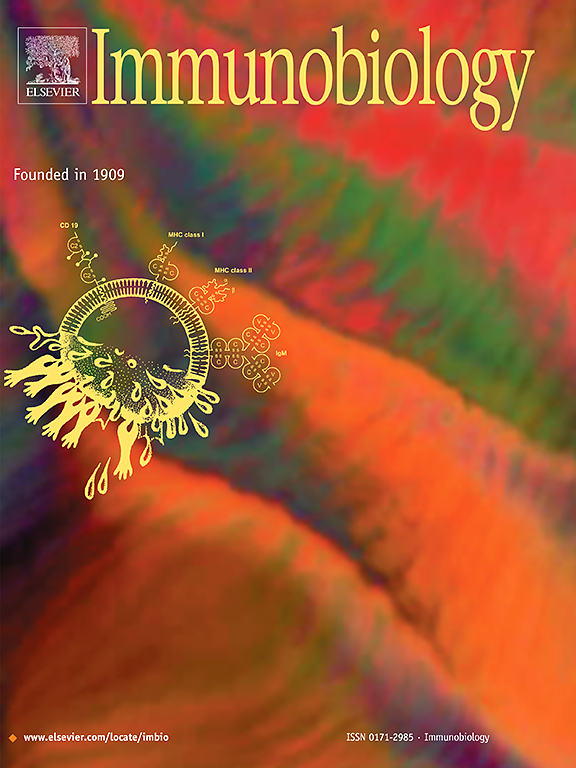减毒鼠伤寒沙门氏菌递送STAT3-siRNA和内皮抑素共表达质粒用于大肠癌的免疫和血管生成调节
IF 2.3
4区 医学
Q3 IMMUNOLOGY
引用次数: 0
摘要
结直肠癌(CRC)是世界范围内男性第三大常见癌症,女性第二常见癌症。由于其高转移率和预后差,结直肠癌是全球癌症相关死亡的主要原因。材料和方法联合基因治疗是一种很有前途的治疗方法,可以用来改变参与癌症发生和发展的基因。本报告描述了一种真核共表达质粒的使用,该质粒编码STAT3 sirna (si-STAT3)和内皮抑素,用于治疗C57BL/6小鼠CRC同种移植物,并使用减毒鼠伤寒沙门氏菌(S. typhimurium)促进质粒的有效递送。结果在本研究中,si-STAT3或内皮抑素单独治疗在CRC同种移植模型中均有抗肿瘤作用,且共表达治疗的抗肿瘤作用更为显著。共表达质粒不仅改变了STAT3和内皮抑素的表达,还下调了MMP2和cyclin D1的表达,上调了caspase 3的表达。CD4+ T细胞、CD8+ T细胞、NK细胞和CD4+CD25+Foxp3+调节性T细胞(Treg细胞)水平也受到联合治疗的影响。此外,联合治疗可改变细胞因子表达,增强抗肿瘤免疫。结论联合基因治疗可抑制结直肠同种移植物肿瘤的生长。本文章由计算机程序翻译,如有差异,请以英文原文为准。
Attenuated S. typhimurium delivery of STAT3-siRNA and endostatin co-expression plasmids for immune and angiogenesis modulation in colorectal cancer
Background
Colorectal cancer (CRC) is the third most common cancer in men and the second most common in women worldwide. Due to its high metastasis rate and poor prognosis, CRC is the leading cause of cancer-related deaths worldwide.
Materials and methods
Combined gene therapy is a promising treatment that can be used to alter the genes involved in cancer genesis and development. This report describes the use of a eukaryotic co-expression plasmid that encodes both STAT3 siRNAs (si-STAT3) and endostatin for the treatment of CRC homografts in C57BL/6 mice, with attenuated Salmonella typhimurium (S. typhimurium) used to facilitate efficient delivery of the plasmid.
Results
In this study, single treatment with either si-STAT3 or endostatin showed antitumor effects in the CRC homograft model, and the co-expression treatment had more significant antitumor effects. Not only did the co-expressed plasmids alter the STAT3 and endostatin expression, this treatment also down-regulated MMP2 and cyclin D1 expression and up-regulated caspase 3 expression. The levels of CD4+ T cells, CD8+ T cells, NK cells, and CD4+CD25+Foxp3+ regulatory T cells (Treg cells) were also affected by the combined treatment. In addition, the combined therapy altered cytokine expression, enhancing antitumor immunity.
Conclusion
The combined gene therapy used in this study additively inhibited colorectal homograft tumor growth.
求助全文
通过发布文献求助,成功后即可免费获取论文全文。
去求助
来源期刊

Immunobiology
医学-免疫学
CiteScore
5.00
自引率
3.60%
发文量
108
审稿时长
55 days
期刊介绍:
Immunobiology is a peer-reviewed journal that publishes highly innovative research approaches for a wide range of immunological subjects, including
• Innate Immunity,
• Adaptive Immunity,
• Complement Biology,
• Macrophage and Dendritic Cell Biology,
• Parasite Immunology,
• Tumour Immunology,
• Clinical Immunology,
• Immunogenetics,
• Immunotherapy and
• Immunopathology of infectious, allergic and autoimmune disease.
 求助内容:
求助内容: 应助结果提醒方式:
应助结果提醒方式:


